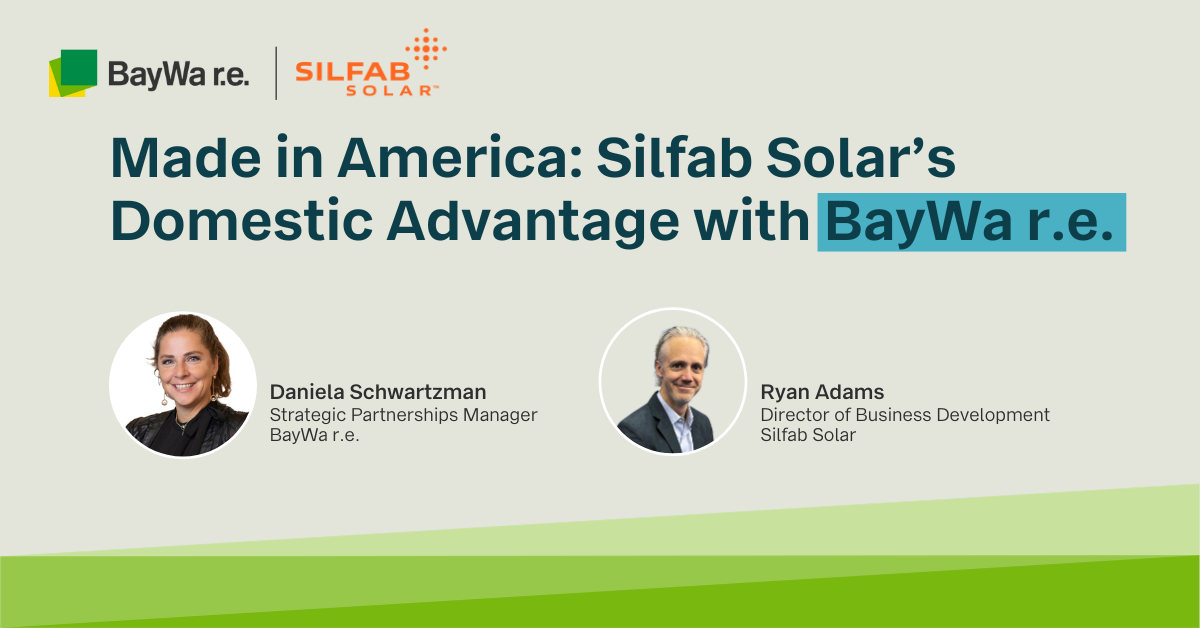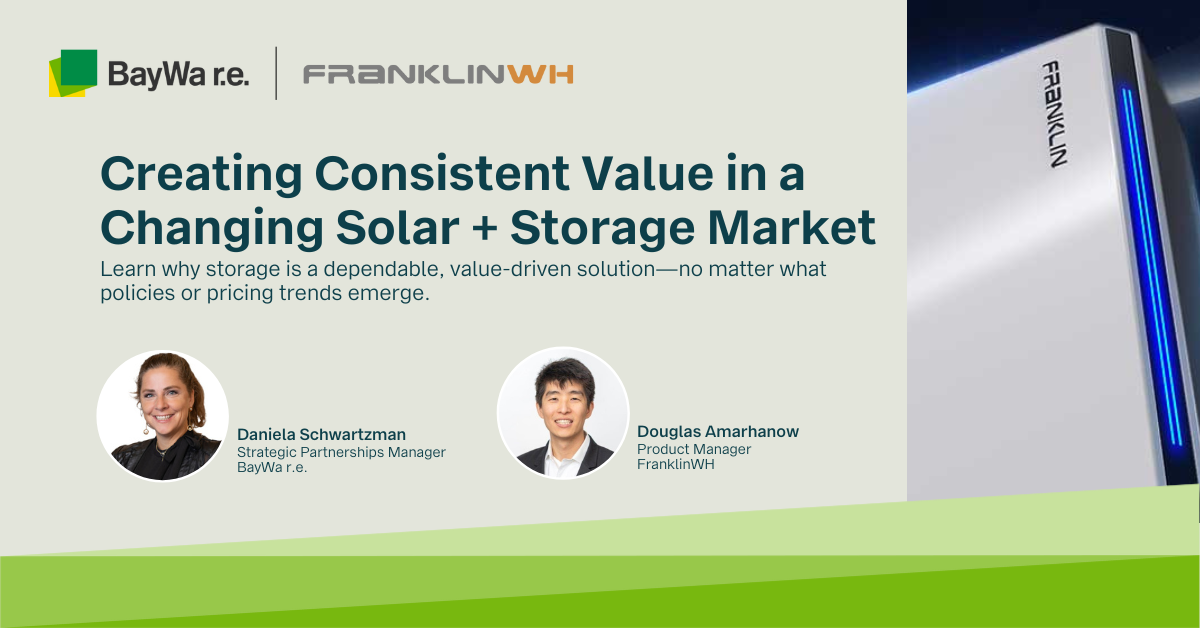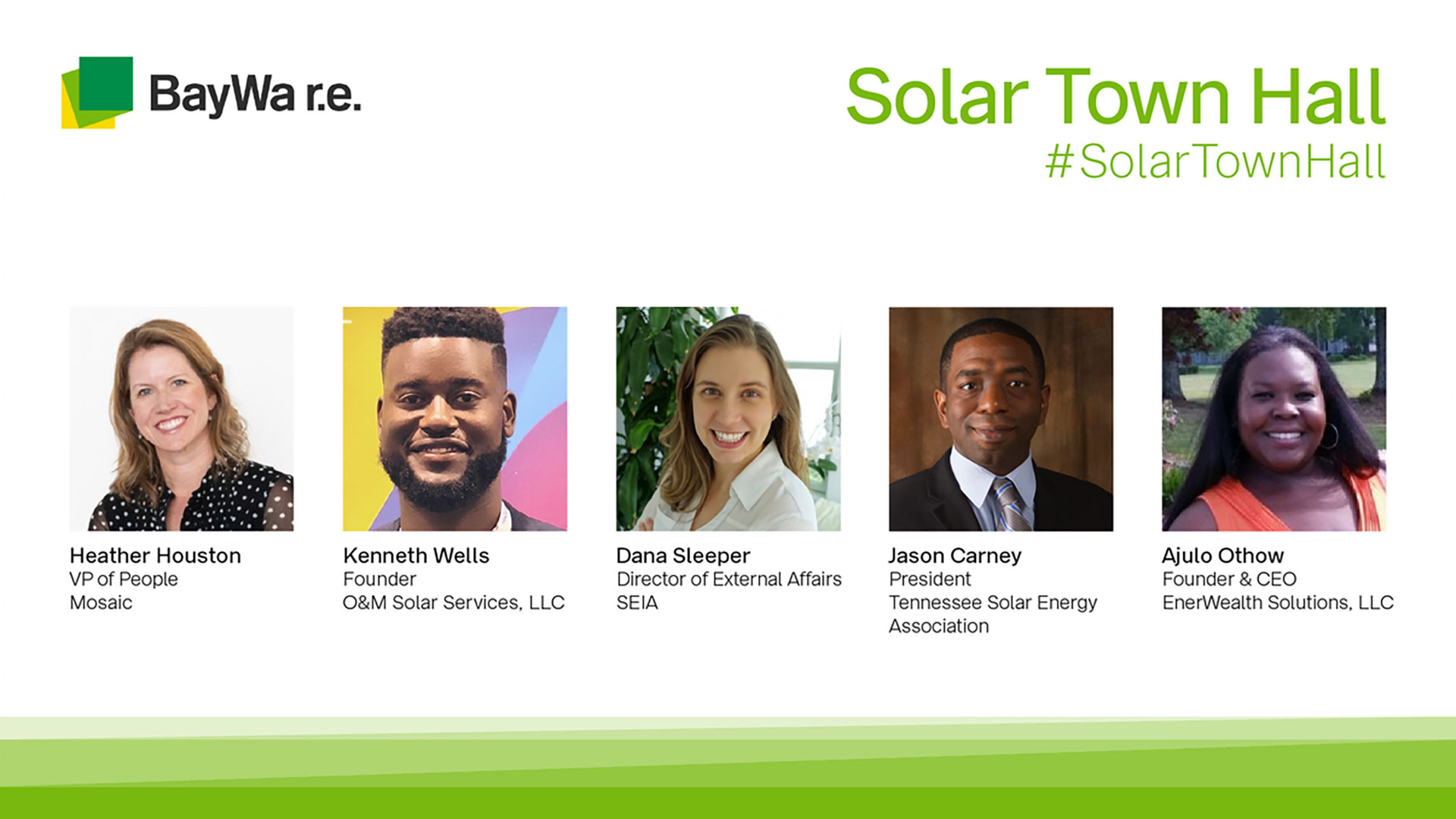
The message is clear: offering residential and commercial solar to under-served communities makes social and business sense. But what actionable steps can our industry take to bridge this solar gap? We have to start by asking — and listening to — the experiences of what solar professionals of color and members of frontline communities. We can also leverage the great initiatives and resources that U.S. industry organizations like SEIA, BOSS (Black Owned Solar Services), and Renewables Forward are offering. That was the premise of our December 9 expert roundtable, and what a stirring, promising conversation it was to wrap our inaugural year of virtual town halls.
Looking for best-in-class products, service, and a partner you can count on?
Our Guests:
Kenneth Wells, Founder of O&M Solar Services, LLC
Dana Sleeper, Director of External Affairs at SEIA
Ajulo Othow, Founder and CEO of EnerWealth Solutions, LLC and Committee Representative at BOSS (Black Owned Solar Services)
Heather Houston, VP of People at Mosaic Solar and Steering Committee Representative at Renewables Forward
Jason Carney, President of Tennessee Solar Energy Association and CEO of Energy Electives, LLC
Scroll down to find our podcast link and to read our full episode recap. Thank you all again for participating in our Solar Town Hall events and being part of our solar community!
“Start a conversation with someone who’s different from you.”
That was the parting advice from our guest Ajulo Othow, Esq., founder and CEO of EnerWealth Solutions. But it was the sentiment that every panelist at our December 9 town hall inevitably conveyed in their observations for our U.S. solar contractor audience.
For Othow — a rural development manager and lawyer by training — solar is personal. The projects she designs are meant to fit the context of the rural North Carolina communities where she lives and serves. Communities where outsiders have long exploited and extracted local resources while leaving residents disenfranchised. “I think we all bring our personal perspective and experiences to this work — how we define a community and also why we’re in this business to begin with,” Othow said. “And as a member of a minority community, as an African-American woman, I bring that experience to the work that I’m doing as well. My experiences with misperceptions about me, my skillset and experiences with discrimination or structural barriers to my goals — all of that informs my work.”
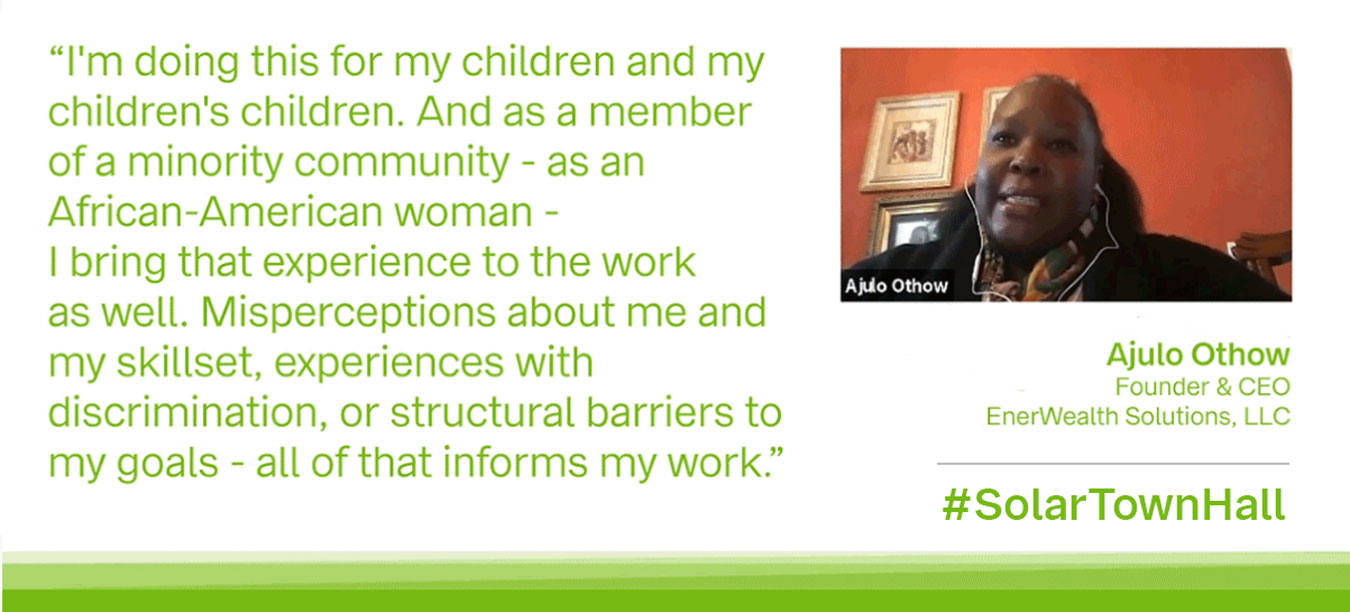
Of course, understanding the communities we serve isn’t just about recognizing city boundaries or honoring lived racial experiences. Differences in personal experience apply to all aspects of life. Kenneth Wells, founder and CEO of O&M Solar Services in the greater Los Angeles region, had received a prison sentence during his teen years. Finding income again — let alone time and money to travel to job training sites — was daunting. But opportunities through GRID Alternatives catapulted his career. “Ten years into the industry, I’m a licensed general contractor, C-10 contractor, NABCEP-certified, and worked with some of the largest residential companies in the nation,” said Wells (who might be the first Solar Town Hall guest to have called in live from the job site). Now leading his own small business, Wells is focusing on reaching back to the same organizations that benefited him, like GRID Alternatives and Homeboy Industries. “We try to get them to make sure those people not only get trained… but those people can also get jobs once they get the training.”
Anecdotes like these – quite different from most solar stories in the industry – emphasize the complexity of a “solar for all” goal. To learn how to reach new communities, U.S. solar professionals should be encouraged to start new conversations and help create new opportunities. The panelists spent the rest of the Solar Town Hall hour on several themes: welcoming spaces, national leadership, mentorship and partnerships, and customer protection.
Renewables Forward and BOSS (Black-Owned Solar Services) are two industry networks that have emerged to start new conversations. “The intent of this group is really about taking action,” said Heather Houston, Vice President of People at Mosaic and a Steering Committee Representative for Renewables Forward. “It’s not about signing your name… it’s that you are joining with the intent to get involved, to roll up your sleeves, to do the work.” The companies and institutions that established Renewables Forward are pledging to assess diversity and inclusion within solar companies; develop and share corporate best practices; create more diverse career pipelines; and invest in under-resourced communities. “Again, how can we compliment and support each other — and not be doing redundant work,” said Houston, recognizing the expertise that reside in other groups, such as BOSS.
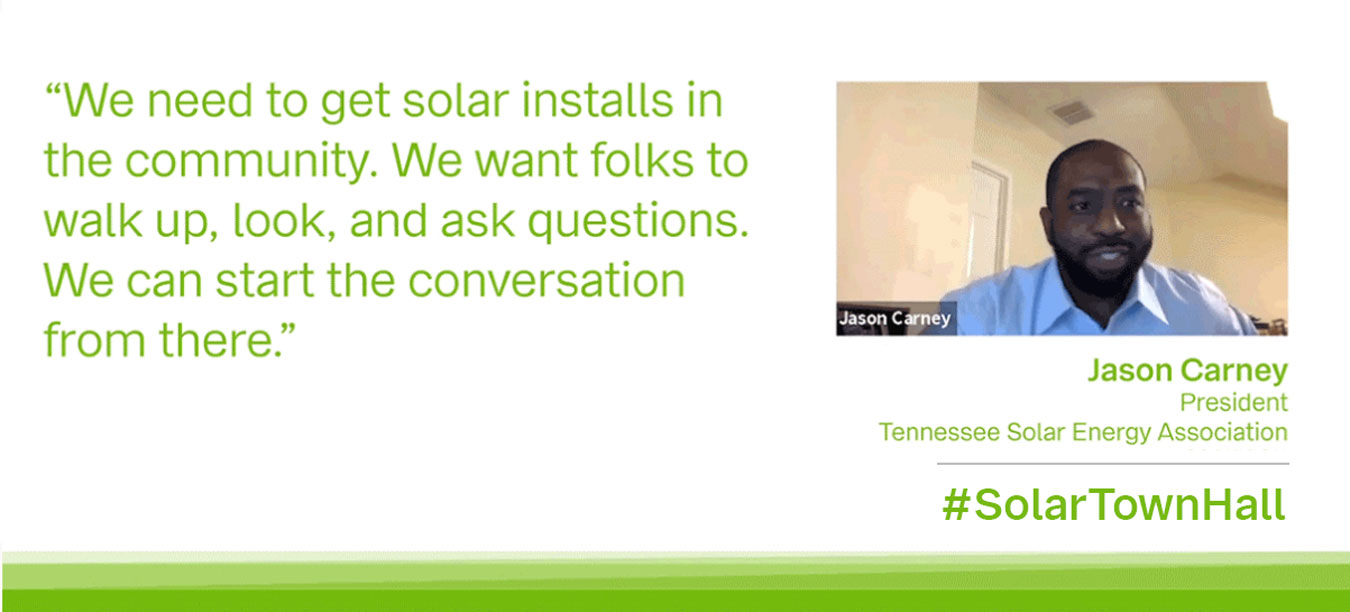
Currently comprised of more than 20 solar, storage, engineering, and operations and maintenance companies from coast to coast — all African-American-owned — BOSS aims to build up the business competence of its member organizations, creating opportunities to co-learn and even collaborate across services. Black solar leaders like Jason Carney, CEO of Energy Electives and President of Tennessee Solar Energy Association, know all too well the feeling of being the only professional of color at industry gatherings. “I’m really happy to be a part of BOSS — it’s sorely needed,” said Carney. “We’re trying to break down that sense of isolation by creating a space where people can come together,” added Ajulo Othow, who serves as a Committee Representative with BOSS.
By strengthening Black-owned businesses for long-term success, the BOSS consortium seeks to take an equal seat at the table in influencing and growing the U.S. solar marketplace. Of course, this need to unite our solar industry is not lost on SEIA. Dana Sleeper, Director of External Affairs with the Solar Energy Industries Association, provided viewers with an update on SEIA’s many planned programs rolling out in 2021. “One of those items is a diverse suppliers database,” said Sleeper, regarding a listing of minority- and women-owned businesses along the supply chain with whom larger companies can collaborate or subcontract. SEIA is also developing an equity and environmental justice policy platform — a set of operating principles along with corresponding policies from state or federal programs — guiding companies on their path to expand community access to solar power. A SEIA certification program for diversity and inclusion is also in the works.
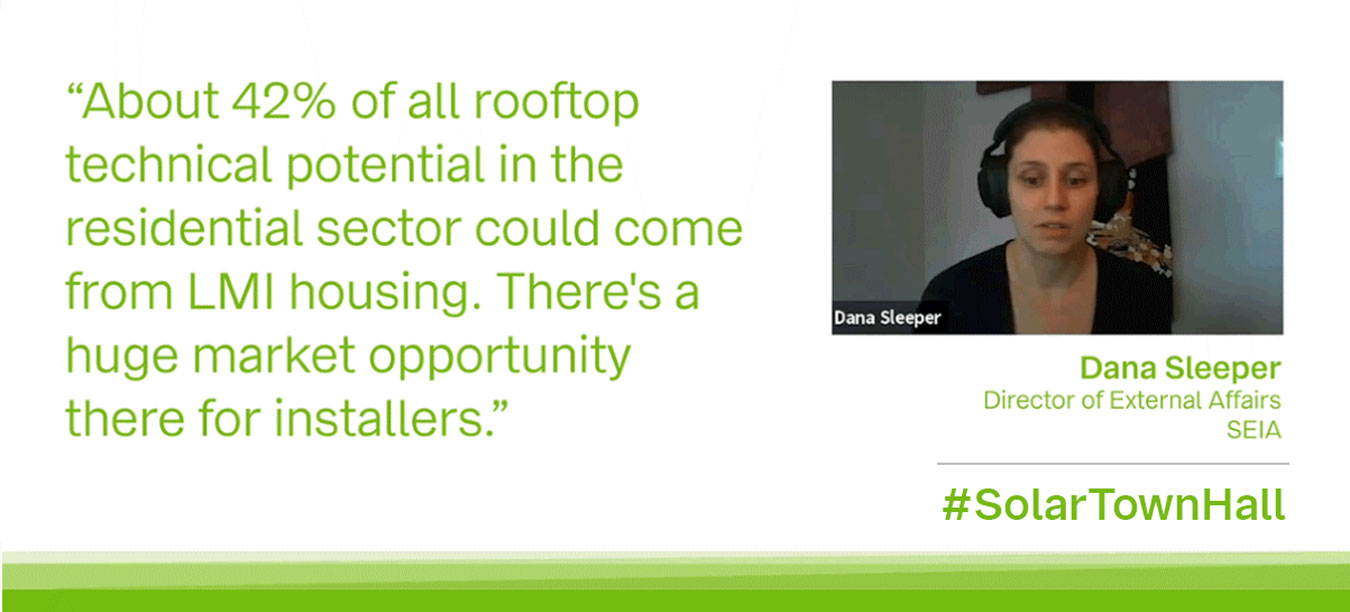
With industry heavyweights and advocates taking equity and access seriously — and taking time to listen to previously unrepresented persons and perspectives — 2021 is shaping up to be a year for breaking down silos and nurturing new ideas. Nowhere is this more important than where the rubber meets the road for our solar contractor community: our team members and customers.
With regards to our employees, mentorship is essential. Opening more careers and opportunities in solar means identifying the organizations building these new pipelines — and being empathetic to the lives of team members newly joining the solar workforce. “Finding those local training programs that are in these communities and finding the right individuals to hire” are a priority, said Kenneth Wells, but also continuing that training on the job. Employers can’t just assume that someone with requisite technical skills will automatically succeed once hired. “Sometimes just having someone that can talk to with them, give them some advice… helps go a long way and keeping them driven and focused,” said Wells, reminding us that everyone’s daily life and home pressures are different. “Hope is something you see with your eye or with your mind’s eye,” Jason Carney reminded viewers. “I believe my role as a solar contractor or an energy consultant can provide encouragement or motivation to all that I come into contact with — especially the marginalized and under-served.”
With regards to engaging customers new to solar, our panelists recommended finding existing bridges and recognizing potential deterrents. “I think that there’s no reason to reinvent the wheel. There are certainly institutions within communities that have always served as the place of education and communication to its neighbors,” said Ajulo Othow. “Black-owned businesses, churches, community colleges, and other sorts of existing institutions, I think, are a really good opportunity to start a conversation with them to say, ‘Can we talk to the folks that you’re talking with?’” This groundwork of outreach and education in overlooked communities is crucial — and can take creative forms. As President of the Tennessee Solar Energy Association, Jason Carney worked with high school students on a solar demonstration project. “And they did everything from design to installation — everything that they didn’t have to have a license for,” said Carney. “And it has been a great catalyst to educate the public — to put ‘physical furniture’ in the community that people can go walk up to see, ask questions about, and start the conversation from there.”
Once we have these conversations, contractors might get a better sense of what the hurdles are for communities and neighborhoods for solar adoption. Financing has been a big challenge in low-income communities, said Kenneth Wells. “When I look at what’s needed in this community, it’s just a proper understanding of the financial geography of those individuals,” said Wells. “And one of the things we do is — instead of using financing options that have a high-interest rate — what we use is either cash deals that we started in the community with those that can afford it. And then you work with organizations like GRID Alternatives to get the rest on.” Ultimately, the root of these questions is how can we make solar opportunities accessible to anyone who wants it, regardless of financial ability or credit score. “And I think that it’s about companies not just declining the borrowers, but routing them to other alternatives,” said Heather Houston. “Really helping find those paths forward — so that folks can find the resources that are available to help them with funding.”
Listen to our entire recording for even more ideas and inspirations from our guest speakers. “It all starts with you,” SEIA’s Dana Sleeper reminded everyone in closing. “All of those sorts of changes are incremental potentially, but they add up. Also, by being involved in a larger organization, you amplify your voice. That’s the whole reason we have trade associations. That’s the whole reason we have these leadership groups — so that we can go in front of the state legislatures and say, ‘this is what we need to make things better.’ So get involved, even if it’s in a small way. It really does make a difference.”
That’s a wrap for our December 9 event recap. Thank you all again for participating in our Solar Town Halls and being part of our solar community! See you in Q1 for an all-new lineup of virtual events from BayWa r.e. Solar Systems.
Subscribe to our newsletter
Stay up to date on the latest industry news, new product releases, BayWa r.e. news and more when you subscribe to our monthly newsletter.
Missed one of our events? Access all of our expert roundtables in our Solar Town Hall archives, find video excerpts on YouTube, and take podcast versions with you on the go via Spotify, Apple, or Google.
BayWa r.e. Solar Systems LLC supplies residential and commercial solar installers in the United States with quality solar + storage components, forecasting, business planning advice, and a community of experts. Visit www.solar-distribution.com to read our industry insights articles and stream our Solar Tech Talk and Solar Town Hall podcasts on YouTube and Spotify. Follow us on LinkedIn, Twitter, and Facebook to stay connected. Ask us about our Split Pay financing program and use our industry-leading Webstore to save time, get gear shipped, and get jobs done! Part of the BayWa r.e. Global family of renewable energy companies.

